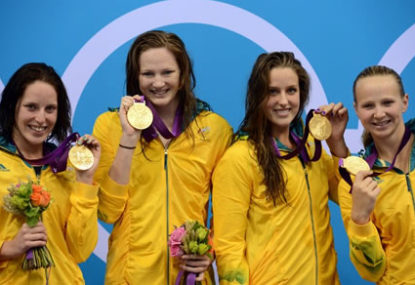'An iconic roster': LeBron, Steph, KD headline all-star cast for Team USA's shot at Olympic glory
LeBron James is going back to the Olympics for the first time in 12 years. Steph Curry is headed to the games for the…

Whether Australia realises it or not, the country is about to reach a fork in the road in its relationship with the Olympics.
Culture is about to clash with reality to meet the demands of a society where silver is considered a failure.
Forget Stilnox, door knocking and pranks calls because this fork centres solely on performance.
Past generations were happy to cheer on any chlorine-clad athlete, as long as they were Australian.
Just representing our nation on the world stage was considered a success regardless of whether you finished first or fifteenth.
We were the little island on the bottom of the globe, but now we hold ourselves in higher esteem, even if sometimes that perception is slightly inflated.
Winning a gold medal, contrary to popular belief, is an extremely difficult task.
The rest of the world zoomed up in the rear view mirror and we failed to notice.
Two reviews into Australia’s Olympic swimming team created sexy headlines. It painted unidentified members of the squad as attention seeking schoolkids while others drowned in a ‘toxic’ atmosphere.
Buried within the pages of both the Bluestone Review of culture and leadership in Australian Olympic Swimming and the Independent Review of swimming was something equally important.
It wasn’t as sexy, but just as relevant.
“The panel received feedback from a number of individuals questioning whether A qualifying times are a high enough benchmark for selection on the team,” the independent review said.
“In many events, swimming an A qualifying time in competition would not see a swimmer progress to a final. This also raises the prospect of tighter team selection, where individuals may not be selected if they are an unrealistic chance of making a final.
“The other issue to a broad selection policy is that the finite resources available to a team must be allocated across a larger group of swimmers (and coaches). By targeting medal potential swimmers, the allocation of resources becomes far more effective.”
That was backed up by a small part of the Bluestone review that said “there were some comments among review respondents that a number of swimmers felt that being an Olympian was abundant success enough; they had no further expectation than being there and competing.”
“Making the team earlier in the year was the win; the rest was a bonus, an experience to savour rather than a job to complete,” one respondent said.
One participant went on to say that “winning was a wish, not a want.”
Tougher benchmarks would lead to a smaller but better resourced team.
It will also change the fundamental message we send to kids.
Coaches and parents tell them that being your best is good enough, but now the message would change to being the best is the only thing that matters.
That’s not necessarily healthy, but is it reality?
Australia’s sports fans need to decide what they want their Olympians to represent.
It either has to be a celebration of a wide variety of sports with an even wider range of outcomes or a targeted assault on gold, silver and bronze.
It can’t be both.
Are we still content with being the parochial nation that wells with pride when we see green and gold on the international stage or have our expectations changed?
Do we want to be our best or the best?
It’s the question that is looming large in that same rear view mirror.